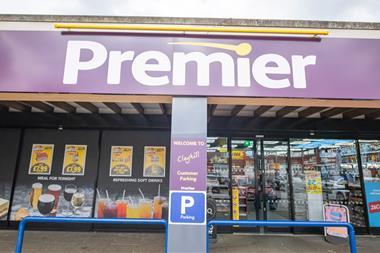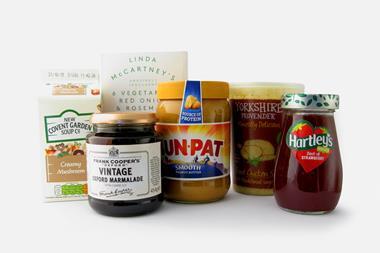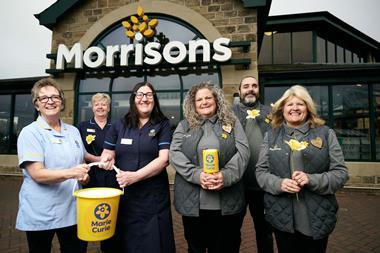3663 is a step ahead of industry challenges, says Ronan Hegarty
Foodservice wholesaling may differ considerably from wholesaler and retailer operations, but there are shared challenges faced by both industries. Fred Barnes, chief executive, has steered 3663 First for Foodservice through quite a few.
Ranked fourth in The Grocer’s Big 30 ranking of UK wholesalers, 3663 First for Foodservice was created when Booker off-loaded its foodservice business to South African company Bidvest in 1999.
It operates five semi-autonomous divisions: 3663 Multi-temperature, 3663 Frozen, Fresh and Chilled, 3663 Contract Distribution, 3663 MoD and 3663 Catering Equipment. The company employs 5,650 people managing 42 depots and servicing 50,000 customers. It had a turnover of £1.18bn in 2004 and has since added £2bn of new business in the past six months.
Barnes says that the relationship with the customer is the biggest difference between foodservice and grocery.
“In grocery the customer is looking for a range of goods at the best possible price. In foodservice price is still a key factor, but our business hinges much more on added value.
“All our customers from bars and hotels to contract caterers are trying to drive footfall. Much of our business is about what we can do to help them improve their customer experience,” he explains.
Otherwise, the challenges facing foodservice read like a checklist of issues that are creating sleepless nights for chief executives throughout the grocery industry - Corporate Social Responsibility, the Working Time Directive, consolidation and the health and obesity agenda.
Barnes says the company was investing time and money in CSR before it became de rigueur. Its environmental management system secured an ISO14001 certification in 2003, which Barnes says is a fairly novel accolade for a company based around transport.
“We have always had good heritage in our company DNA in terms of CSR, but it is always something we are looking to improve,” he says.
The company’s philosophy of continual improvement extends to the most important aspect of the business, its staff. Recent industrial discontent among lorry drivers elsewhere in food distribution is an issue that 3663 identified as a threat over a year ago. It promptly took the necessary steps to avoid any conflict.
“Our business is underpinned with about 1,000 drivers working directly for us, and there were issues involving the Working Time Directive and the highly competitive UK labour market,” says Barnes.
Fearing a national driver shortage, the company set up its own driver academy to train and develop its own drivers. As well as offering the usual driver training, the academy also gives staff the opportunity to develop other skills and work towards qualifications such as NVQs.
“I am delighted to say that we have come through this problem and are now in better shape as a company than before we addressed it,” says Barnes.
The other area where 3663 is striving to lead the way is with regard to health, diet and obesity. 3663 has been working with the Food Standards Agency for 18 months on reducing salt in all its own-label 3663 Smart Choice products by 50% by November this year. It has also developed clearer labelling for its catalogues in order to make it easy for chefs to see nutritional values of dishes.
Barnes says that driving the health agenda is key for its institutional customers such as schools and hospitals. But it is also becoming increasingly relevant in the higher profit sectors of bars, hotels and restaurants.
3663 won a £1bn contract to supply Kentucky Fried Chicken at the beginning of the year and is geared up for further growth with similarly large customers.
Looking to the future, it also remains as committed to smaller customers, Barnes insists, adding that 3663 is also on the acquisition trail. “At present, we do have a fairly complete offer, but one area that is likely to become more important is the ability to supply a specialist fresh offer. This is certainly an area in which we would like to improve our range.”
Foodservice wholesaling may differ considerably from wholesaler and retailer operations, but there are shared challenges faced by both industries. Fred Barnes, chief executive, has steered 3663 First for Foodservice through quite a few.
Ranked fourth in The Grocer’s Big 30 ranking of UK wholesalers, 3663 First for Foodservice was created when Booker off-loaded its foodservice business to South African company Bidvest in 1999.
It operates five semi-autonomous divisions: 3663 Multi-temperature, 3663 Frozen, Fresh and Chilled, 3663 Contract Distribution, 3663 MoD and 3663 Catering Equipment. The company employs 5,650 people managing 42 depots and servicing 50,000 customers. It had a turnover of £1.18bn in 2004 and has since added £2bn of new business in the past six months.
Barnes says that the relationship with the customer is the biggest difference between foodservice and grocery.
“In grocery the customer is looking for a range of goods at the best possible price. In foodservice price is still a key factor, but our business hinges much more on added value.
“All our customers from bars and hotels to contract caterers are trying to drive footfall. Much of our business is about what we can do to help them improve their customer experience,” he explains.
Otherwise, the challenges facing foodservice read like a checklist of issues that are creating sleepless nights for chief executives throughout the grocery industry - Corporate Social Responsibility, the Working Time Directive, consolidation and the health and obesity agenda.
Barnes says the company was investing time and money in CSR before it became de rigueur. Its environmental management system secured an ISO14001 certification in 2003, which Barnes says is a fairly novel accolade for a company based around transport.
“We have always had good heritage in our company DNA in terms of CSR, but it is always something we are looking to improve,” he says.
The company’s philosophy of continual improvement extends to the most important aspect of the business, its staff. Recent industrial discontent among lorry drivers elsewhere in food distribution is an issue that 3663 identified as a threat over a year ago. It promptly took the necessary steps to avoid any conflict.
“Our business is underpinned with about 1,000 drivers working directly for us, and there were issues involving the Working Time Directive and the highly competitive UK labour market,” says Barnes.
Fearing a national driver shortage, the company set up its own driver academy to train and develop its own drivers. As well as offering the usual driver training, the academy also gives staff the opportunity to develop other skills and work towards qualifications such as NVQs.
“I am delighted to say that we have come through this problem and are now in better shape as a company than before we addressed it,” says Barnes.
The other area where 3663 is striving to lead the way is with regard to health, diet and obesity. 3663 has been working with the Food Standards Agency for 18 months on reducing salt in all its own-label 3663 Smart Choice products by 50% by November this year. It has also developed clearer labelling for its catalogues in order to make it easy for chefs to see nutritional values of dishes.
Barnes says that driving the health agenda is key for its institutional customers such as schools and hospitals. But it is also becoming increasingly relevant in the higher profit sectors of bars, hotels and restaurants.
3663 won a £1bn contract to supply Kentucky Fried Chicken at the beginning of the year and is geared up for further growth with similarly large customers.
Looking to the future, it also remains as committed to smaller customers, Barnes insists, adding that 3663 is also on the acquisition trail. “At present, we do have a fairly complete offer, but one area that is likely to become more important is the ability to supply a specialist fresh offer. This is certainly an area in which we would like to improve our range.”
















No comments yet